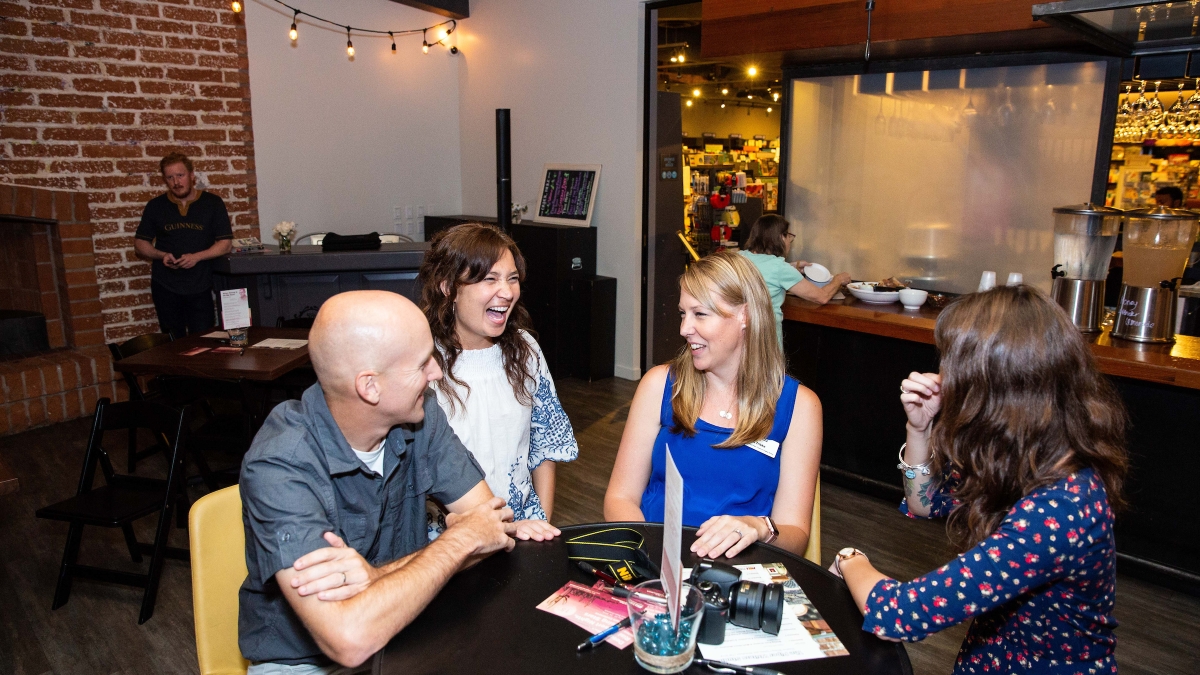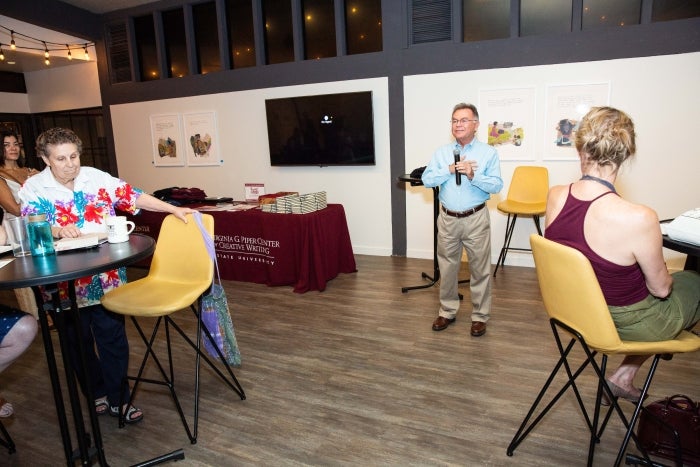The excitement in Arizona Poet Laureate Alberto Ríos’ voice when he tells a crowd of people gathered at a recent Changing Hands Bookstore event in Phoenix that he will soon become a grandfather is palpable — just as it is when he announces the roller coaster of new classes, events and projects that ASU’s Virginia G. Piper Center for Creative Writing has just begun to ascend this fall semester.
Ríos, a University Professor of English and director of the center, has been with Arizona State University for going on 37 years. So naturally, he was there when accomplished author and Professor Jewell Parker Rhodes (whom he enticed to ASU back in the 1980s) founded the Piper Center back in 2003, as a way of bridging the resources of the university to the non-academic literary community at large and engaging them in continued education.
As he wraps up his address to the faculty, staff, students and local writers assembled at the bookstore for the center’s Summer Social fundraising event with a reading of his poem, “When Giving Is All We Have,” it’s clear he believes what he’s saying: that literature matters because it has the power to move us; that it can bring people together for a common good; and that it is the responsibility of the center to facilitate that service in the community.
“I hope that is the mission of Piper Center in its entirety: that we create something greater from the difference,” Ríos said, borrowing a line from his poem. “Everything we are doing and everything that we will do will be with a bias toward meaning. It should matter.”
Rhodes recalls when she was asked to begin building the center nearly 20 years ago.
“I think of that as one of the most exhilarating times of my life because there was no blueprint,” she said. “The mandate was to create a center that would engage internationally but also act as a hub for the Southwest literary community. And I don’t know of any other center founded in that particular way.”
Neither does Felicia Zamora, education programs coordinator for Piper Center, who came on board just last August. She has been working in higher education for 16 years and has yet to come across anything quite like it.
“It’s extraordinary to me because at Colorado State (where she used to work), a place like Piper didn’t exist. At most other universities in the country a place like Piper doesn’t exist,” she said.
In less than a year, Zamora has taken the center’s already robust community offerings and tailored them with an eye toward increasing access.
“A lot of people find their way to ASU through Piper,” she said. “ASU is leading the nation in continuing education, and that’s very much engrained in Piper, too. I think these centers of noncredit development that give the opportunity for people to build skill sets is extremely important because just because you have a degree doesn’t mean you stop learning in areas that are important to you.”
A new “pay-as-you-can” model allows course participants to do just that, because the bottom line is far from Piper’s main concern.
“The Piper Studio is just a small revenue-generating arm so we can build classes that are free for more populations,” Zamora said. “We don’t want someone to not be able to attend a class because of socioeconomic barriers.”
The Piper Center is in the midst of piloting a visiting faculty program that brings in authors from across the country to teach some of the 16 courses available this fall in a range of genres, from poetry to flash fiction to screenwriting to memoir. Two of the courses will be offered online — a first for the center — and earlier in the spring, Piper held its premiere bilingual creative writing course. In addition, plans are underway to create summer courses in 2019 to better engage youth and teens.
Increasing the variety and accessibility of courses is something Zamora said came out of listening to the community.
“To me, that’s what we should be doing as a center: adapting what we do to who we’re serving,” she said.
All students of the center are invited to share their work at this year’s second annual Piper Writers Showcase in December. And as always, everyone is invited to participate in the center’s signature conference, Desert Night, Rising Stars, which celebrates its 15th anniversary in 2019. New to the conference is an exhibitor fair that will be open to the public, a free Saturday night reading and more.
The slew of upcoming conferences, events and readings will kick off this Thursday, Sept. 20, with Motionpoems, a collection of short films based on poems. Two of ASU English professor Natalie Diaz's poems will be featured at the event: "American Arithmetic" and "Cranes, Mafiosos, and a Polaroid Camera."
Diaz said she was drawn to the project because she loves film and thinks in images.
"The word imagination is made up of image," she said. "There can be no future without images, without the images of our past that we dream or Rubik's cube into a new configuration of what is possible."
Both poems will be part of her second book, "Post Colonial Love Poem," which will be available in 2020, and have influenced her Ford Justice Grant work.
For more info about all the goings-on, check out the Piper Center events page. Also find a full list of classes; use the code "CareerMove" for 25 percent off new online classes in revising the novel and publishing opportunities.
Top photo: Piper Center education programs coordinator Felicia Zamora (second from left) chats with communtiy members at the center's Summer Social fundraising event in August. Photo by Deanna Dent/ASU Now
More Arts, humanities and education

ASU professor's project helps students learn complex topics
One of Arizona State University’s top professors is using her signature research project to improve how college students learn science, technology, engineering, math and medicine.Micki Chi, who is a…

Award-winning playwright shares her scriptwriting process with ASU students
Actions speak louder than words. That’s why award-winning playwright Y York is workshopping her latest play, "Becoming Awesome," with actors at Arizona State University this week. “I want…

Exceeding great expectations in downtown Mesa
Anyone visiting downtown Mesa over the past couple of years has a lot to rave about: The bevy of restaurants, unique local shops, entertainment venues and inviting spaces that beg for attention from…



